Johnson, Vinodrai, Wolfe receive UTM-MN Faculty Funding Awards
The University of Toronto Mississauga Mobility Network (UTM-MN) has announced three recipients of 2023 UTM Mobility Network Faculty Funding Awards.
The awards will enable faculty to pursue research and contribute to the important field of knowledge around mobility in our communities.
About the award winners and their funded research
Johnson: Making road infrastructure healthier for urban ecosystems
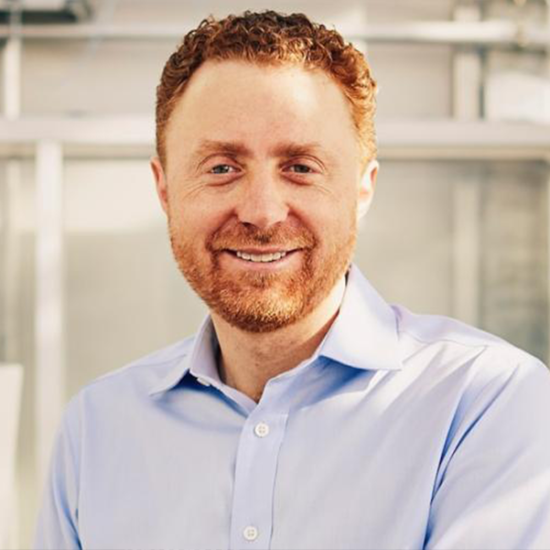
Marc Johnson, a professor in the Department of Biology and director of the Centre for Urban Environments at UTM, will use the funding to extend his work on urban landscape changes and their impacts on ecosystems and environmental health. The award will help Johnson purchase computer software and equipment and hire a research assistant to support his research.
Johnson's project will provide insight into the impacts of roadways and traffic on key indicators of ecosystem health. The results of the study will lead to concrete recommendations for urban planners and policy makers on how to make road infrastructure healthier for urban ecosystems.
Vinodrai and Wolfe: Researching clusters, mobility, and economic vulnerability in Canadian cities
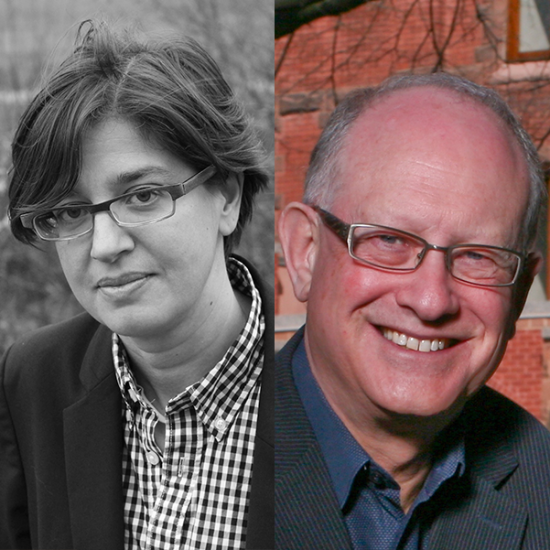
A joint project by Tara Vinodrai, an associate professor in the Institute for Management and Innovation at UTM, and David Wolfe, a professor of political science at UTM and co-director of the Innovation Policy Lab at the Munk School of Global Affairs & Public Policy, will leverage UTM-MN funding to purchase custom data drawn from the 2021 Canadian Census of Population and hire a research assistant to pursue research on clusters, mobility, and economic vulnerability in Canadian cities.
The funded project will help Vinodrai and Wolfe build a foundation for future in-depth research and peer-reviewed articles, and facilitate their collaboration on topics related to clusters, mobility, innovation, and regional dynamics.
About UTM-MN Faculty Funding Awards
UTM-MN faculty-led initiatives are funded in support of Mobility Network’s mission to foster interdisciplinary mobility research that addresses equity and promotes resilient, sustainable, and just urban growth and prosperity. The work contributed by these leading researchers expands our collective knowledge of inclusive cities and societies, healthy lives, and a sustainable future.
With files from UTM-MN.
With the increasing popularity of electric vehicles, car-related air pollution will be less of a concern, right? Think again, say a group of University of Toronto researchers who are studying the effects of air pollution from brakes and tires.
While the push to mandate EV aims to reduce tailpipe emissions such as carbon dioxide – the federal government has set a target of complete EV adoption by 2035 – swapping every vehicle on the road still won’t eliminate all the sources of air pollution that can impact human health.
That's because brake pads, rotors and tires grind down over time and erode. This results in tons of particulate matter like heavy metals and microplastics polluting the air.
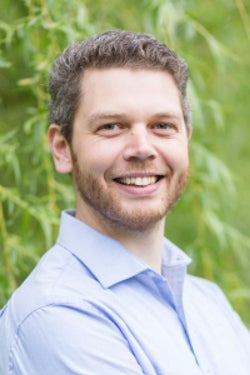
"Millions of tires being driven on the road breaking down –that’s a problem," says Matt Adams, an assistant professor in U of T Mississauga’s department of geography, geomatics and environment. "It’s an emerging question in the field – it’s hard to know where the particles end up."
Adams and Greg Evans, a professor of chemical engineering and applied chemistry in U of T's Faculty of Applied Science & Engineering, belong to a team of U of T researchers who are conducting a three-year study, "Improved Characterization of the Real-World Contributions and Impacts of Non-tailpipe Particulate Matter Emissions," to learn more about tailpipe vs. non-tailpipe emissions. The study is for a U.S.-based organization called the Health Effects Institute, which gathers research on the effects of air pollution. Other researchers include: Professor Marianne Hatzopoulou and Associate Professor Arthur Chan in the Faculty of Applied Science & Engineering; Associate Professor Meredith Franklin in the department of statistical sciences in the Faculty of Arts & Science; and McGill University's Scott Weichenthal and University of Barcelona visiting professor Maria Pérez.
Evans says the source of vehicle pollution has shifted in recent years.
"Because of changes in vehicle technology, tailpipe emissions particularly from cars has dropped off a lot over the last two decades," Evans says. "What we found with research we’ve done in Toronto is that, since 2013, non-tailpipe emissions have exceeded tailpipe emissions."
While tires are made from a combination of plastics and rubber, brakes are made of heavy metals, including iron, barium and copper.
Particles of heavy metals, microplastics and micro rubber from tires and brakes pollute the air and can contribute to a range of negative health outcomes. Some heavy metals like copper can cause oxidative stress when inhaled. Lungs suffer from inflammation and an immune response is triggered.
"There is not an organ in your body that’s not impacted by air pollution," Adams says. "We know your health risk is increased. We know a lot of these pollutants are carcinogens. [It] can contribute to cardiorespiratory issues."
Evans says the researchers hope the study will improve methods of gathering vehicle pollution data.
"At the end of it, we’re hoping to have better methods to able say how much is coming from tailpipe and how much is non-tailpipe, and how do we identify hot spots," he says.
The findings could potentially result in regulations for tire and brake emissions. In late 2022, the EU proposed new Euro 7 standards to reduce vehicle emissions and improve air quality. The new proposals were the first worldwide emissions standards to set additional limits for emissions from tires and brakes.
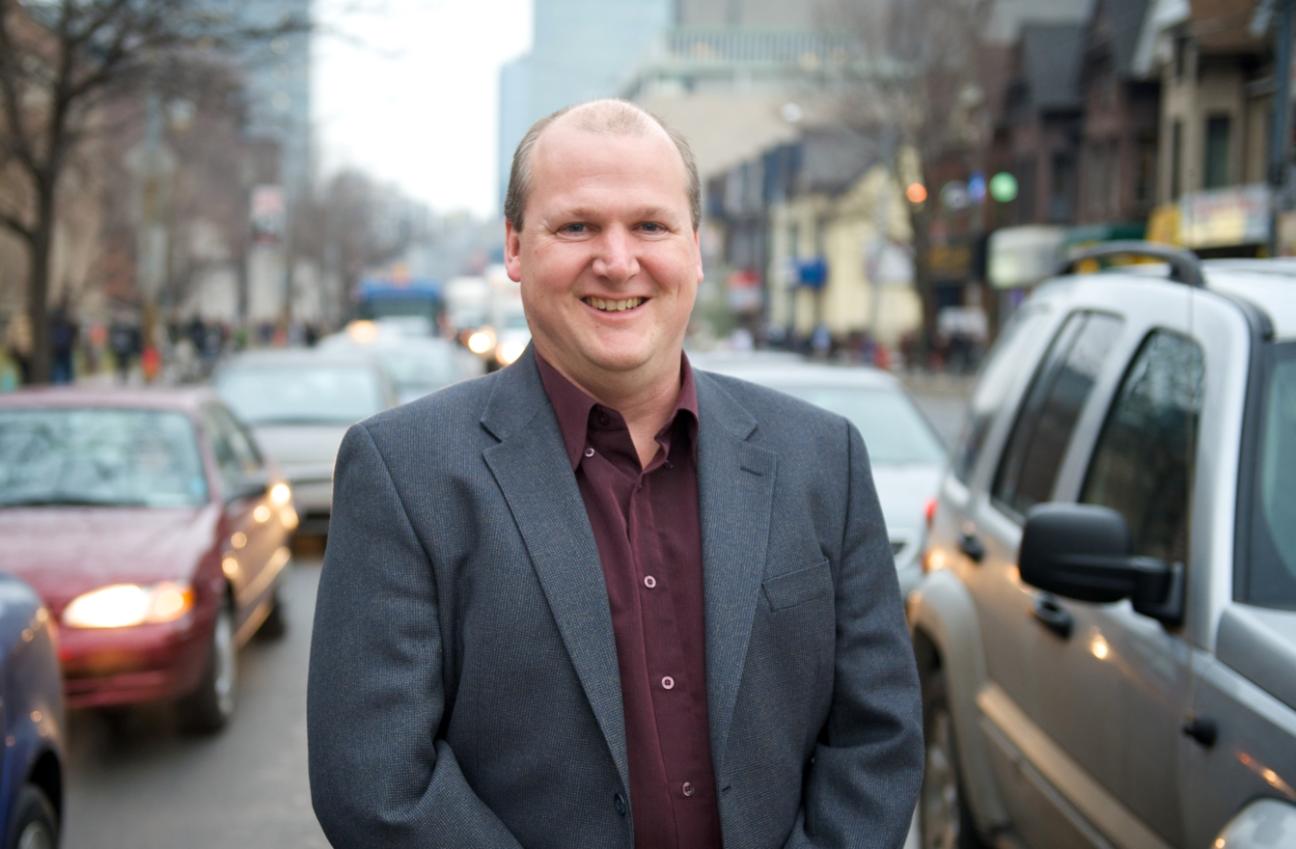
Adams says there are additional considerations when switching over to EVs, including the source of electric power, lithium sourcing and related infrastructure.
"We’re trying to translate the links of how and where you are in the urban environment to your exposure [to air pollution], and then using that to plan cities better for our health," Adams says.
Planning more healthy cities means building urban areas where people can walk, cycle and take public transit in addition to adopting EVs.
"Air pollution is tricky," Adams says. "It’s invisible for the most part –we don’t smell it. We’re trying to quantify the intangible for the average person."
This story by Ali Raza was originally posted by U of T News, March 16, 2023.
Professor Matthew J. Roorda, on behalf of the Smart Freight Centre, invites you to the next seminar in the Smart Freight Centre’s Leadership Seminar Series.
Professor Diana Ramirez-Rios will present "Using Freight Trip Generation to Estimate Impacts on Air Quality of Diesel Truck Emissions of Urban and Industrialized Areas" on Friday, March 24, 2023, from 11 AM to 12 PM at the ITS Lab, Room SF3103, Sandford Fleming Building.
A hybrid option will be available. The seminar will be streamed at https://utoronto.zoom.us/j/87172403711.
All are welcome to attend this free event presented by the Smart Freight Centre and the University of Toronto ITE Student Chapter, UT-ITE. No registration is required. If any specific accommodations are needed, please contact smartfreight@utoronto.ca as early as possible.
About the presentation
Today’s society faces numerous challenges exacerbated by climate change, globalization, and socio-economic inequities, to name a few. Air contamination from diesel and gasoline-fueled vehicles is one of the main concerns and issues discussed at a worldwide level. Thirty countries are supporting the Glasgow Climate Pact (COP26) initiative from the United Nations to have zero emissions by 2040. The United States is not part of the group, but the country’s policies are in line with a zero-emissions policy, which heavily concerns the freight transportation sector.
This research focuses on the diesel and gasoline-based vehicles’ emissions caused by daily freight trip generation (FTG) activity in urban and industrialized cities.
We showcase the case of Oakland, California, home to one of the largest ports and next to one of the largest metropolitan areas in the United States. We used data from Oakland’s industrial district and adjacent commercial districts to estimate daily FTG and air quality health data to analyze the impacts of air pollutants on residents in the city. This study provides a unique analysis of the impacts caused on Oakland residents’ health due to the daily exposure to the harmful pollutants caused by freight vehicles (CO, CO2, NOx, PM2.5, and PM10). The findings help us develop novel data-driven permitting strategies that could potentially reduce air pollution exposure from freight activity for residents adjacent to industrial and commercial areas.
About the speaker

Dr. Diana Ramirez-Rios is an assistant professor at University of Buffalo with a PhD in Transportation Engineering from Rensselaer Polytechnic Institute and a B.S.-M.S. in Industrial Engineering. Her work focuses on freight transportation, supply chain and logistics, and humanitarian/disaster response logistics. Her research includes freight demand modeling, parking simulation, facility location, supply chain coordination, post-disaster location and distribution, and cooperative game-theoretic models. Diana holds leadership positions in several professional organizations including the POMS as the Regional VP for the Americas, and Subdivisions Council Representative at INFORMS. She is also a member and paper review coordinator for the Freight Data Committee at the Transportation Research Board. She is the recipient of the Karen and Lester Gerhardt Prize in Science and Engineering, the Thomas Archibald Bedford Prize, the WTS Helene M. Overly/ Leonard Braun Graduate Scholarship, ENO Future Leaders in Transportation Fellow, and the CEE-MIT Rising Stars.
The Transit Analytics Lab (TAL) of the University of Toronto brings together transportation and technology researchers from across the University of Toronto, transit systems in the Golden Horseshoe area, and private sector technology providers and consultants.
Among its objectives are to: foster innovation in transit data-driven tools (analytics) using advanced methods of data science, machine learning, artificial intelligence, simulation and statistics; expose the professional community through knowledge transfer activities to advanced analytics; build collaborations with public and private organizations; and establish U of T as a national and international leader in transit data analytics.
TAL was launched in 2020 with the International Symposium on Automated Transit Data. Since then, TAL has organized workshops and has been involved in a number of research pursuits, many of which have practical applications.
The time is appropriate to host our annual TAL Research Day workshop that will provide a high-level overview of the many research activities being pursued by the TAL team; please see the Draft Program below.
The TAL Research Day will be held virtually and is free, though registration is required.
Agenda
9:00 a.m. Introduction to the Transit Analytics Lab (TAL)
-
-
- Words of Welcome and Update on TAL Activities (Amer Shalaby)
-
9:15 Transit Analytics to Support Planning (Moderator: Brendon Hemily)
-
-
- Constructing Origin-Destination Demand Matrix using Wi-Fi and AFC Gate Count Data: A Case Study of Toronto’s Subway Network (Diego Da Silva)
- Trends in Toronto’s Transit Ridership Recovery: Insights from Subway Wi-Fi Records (Roger Chen)
- Modelling On-Demand Transit Ridership (Alaa Itani)
-
10:15 Break
10:30 Operations Analytics to Improve Rail Performance (Moderator: Amer Shalaby)
-
-
- Impact of Subway Service Disruption on User Mobility: Analysis and Visualization Using Customer Facing Wi-Fi Data in Toronto (Aidan Grenville)
- Short-term Prediction of Crowd Flows at Subway Stations using Wi-Fi Data and Graph Neural Networks Modelling (Diego Da Silva)
- Mitigating Subway Station Overcrowding via Passenger Inflow Control (Chandler White)
- SPUR: Modular, Data-Driven Mesoscopic Simulation Platform to Analyze Stochastic Railway Networks (Peter Lai)
-
11:30 Lunch Break
12:30 p.m. Keynote: A Conversation with John Levin on Transit Data and Analytics
- John Levin, Director-Strategic Initiatives, Metro Transit (Minneapolis)
1:30 Analytics to Support Bus Operations (Moderator: Brendon Hemily)
-
-
- Leveraging Large Language Models (LLMs) for Improving Public Transit Systems: An Exploration of GPT Models and State-of-the-Art Applications (Jiahao Wang)
- Extraboard Operator Planning and Scheduling Under Uncertainty (Jilin Song)
- Impacts of Transit Driver Advisory System with Space and Time Priorities on Route Performance (Kareem Othman)
-
2:30 Break
2:45 Analytics to Support Planning and Deployment of Zero Emission Buses (ZEBs (Moderator: Amer Shalaby)
-
-
- Insights from the Research on ZEB Deployment (Diego Da Silva)
- Optimization Model for Planning On-Route Charging Infrastructure and Schedules of ZEB Fleets (Lorna Licollari)
- Data-Driven Prediction of e-Bus Battery Consumption Rates using Machine Learning (Kareem Othman)
-
3:45 Wrap-Up
4:00 End of Research Day
Download the TAL 2023 Research Day agenda.
Registration
Register on Eventbrite for this virtual event.
Free. All are welcome.
If any specific accommodations are needed, please contact mobilitynetwork@utoronto.ca. Requests should be made as early as possible.
Above: Purolator's Dr. Daniel Baron (L) accepts U of T Sustainable Action Award from Scott Hendershot (R), Senior Manager, Sustainability Office, University of Toronto, at the Adams Sustainability Celebration Award Ceremony, March 3, 2023. (Photo: Tory Grewar)
Purolator Inc. was awarded the University of Toronto Sustainable Action Award, External Business or Partner category, on March 3, 2023, at the 2022-23 Adams Sustainability Celebration Award Ceremony and Innovation Pitch Prize Competition held at Hart House, University of Toronto.
The award recognizes individuals and teams who make tangible contributions to sustainability at U of T. Purolator received the award for the recent launch of their Urban Quick Stop mini hub pilot project on the U of T St. George campus.
The Urban Quick Stop serves as a mini hub for couriers on electric cargo bikes to retrieve and deliver packages to the surrounding areas, thus reducing the need for traditional courier delivery trucks. This results in a more sustainable approach to delivering and less traffic congestion.
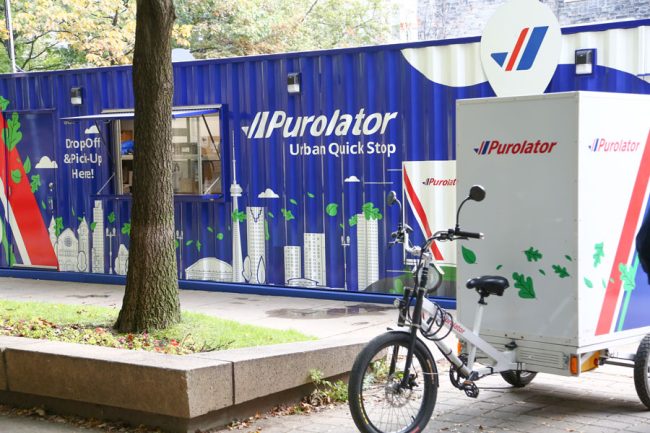
Our Urban Quick Stops and our partnership with the university is helping address challenges associated with last-mile delivery.
Additionally, the involvement of U of T graduate and undergraduate students in this project, and as part of Purolator Research Chair retained activities, has been invaluable. They have brought new ideas and perspectives, helping us continuously improve and innovate.
Khelil Khelil, Senior Manager of Applied Research and Innovation, Purolator
In partnership with the university, Purolator expects to achieve many sustainability benefits, including a reduction of approximately 5,800 km travelled per year on the U of T campus and neighbouring community roads. This translates into approximately 2.3 tonnes of CO2 emissions per year. The project also reduces the emission of nitrogen oxides (NOx), a pollutant that causes respiratory health problems, leading to measurable health impacts.
Purolator is most deserving to receive the Sustainable Action Award, as an outcome of their leadership toward making this project happen on the University of Toronto campus. It is a unique example of sustainability research ‘hitting the road’.
Matthew Roorda, U of T civil engineering professor and Canada Research Chair in Freight Transportation and Logistics
Purolator states that they are proud to partner with the University of Toronto and look forward to expanding their Urban Quick Stops across Canada in the future.
As their prize, Purolator received a plaque made out of honey locust wood reclaimed from the U of T Landmark Project. The inscription reads: "The University of Toronto Sustainability Office awards this Sustainable Action Award to Purolator Inc. in recognition of their extraordinary contributions to sustainability at the University of Toronto and in the community."
The 2023 Adams Sustainability Celebration Innovation Prize pitch competition and award ceremony is supported by the donation of Wendy Adams.
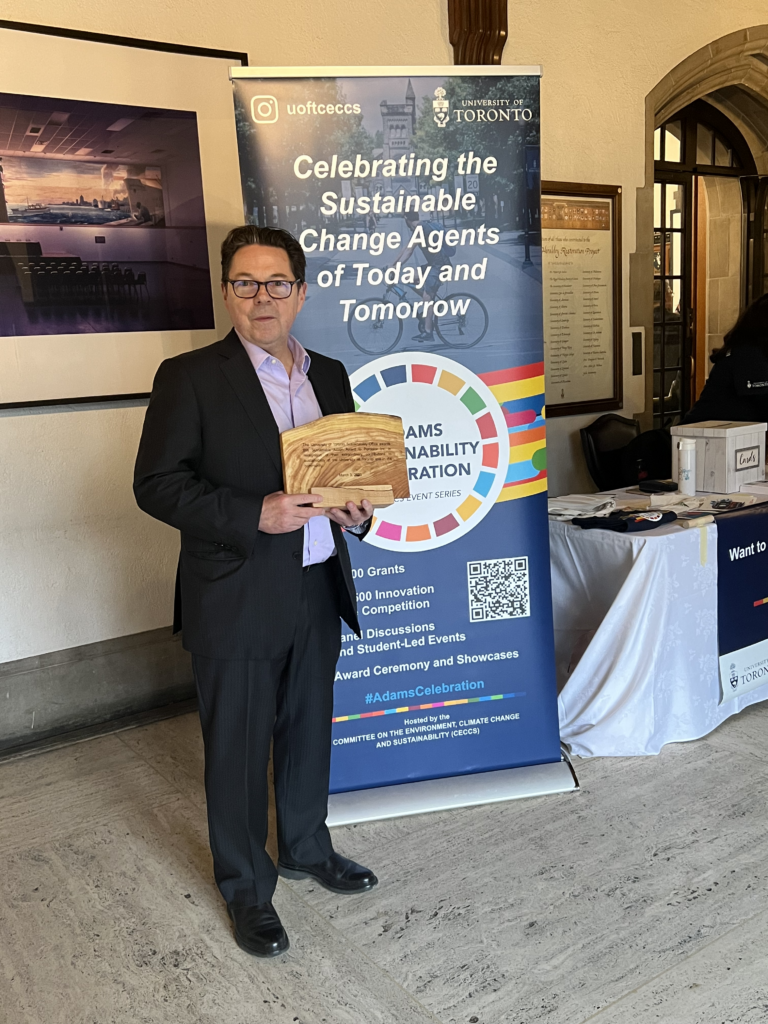
Adams Sustainability Celebration Award Citation
Purolator, in partnership with University of Toronto, has established a successful e-cargo tricycle demonstration project.
On August 22, 2022, Purolator replaced delivery trucks on the University of Toronto St. George campus, and in neighbouring communities, with e-cargo tricycles operating from a minihub located at 60 St. George Street.
This pilot is demonstrating the potential for e-cargo tricycle deliveries with potential expansion to other locations across Canada. Purolator is now delivering more sustainably on campus, with reduced emissions, fewer cyclist conflicts, and truck driver health improvement. Gasoline powered trucks have been replaced by electric cargo tricycles, leading to measurable health impacts.
Courier trucks emit about 1.4 g of nitrogen oxides (NOx) per km, a pollutant which causes respiratory health problems. The project results in an estimated reduction of 800 g of NOx annually from Purolator trucks.
A long list of graduate and undergraduate students have been involved in research associated with this project. These include women, Black and Muslim students, all under-represented groups in transportation and logistics.
U of T installed air quality sensors inside the cab and outside the cab of a Purolator truck. U of T found that drivers were exposed to a 25% higher rate of particulate matter (PM2.5) in the cabs of their trucks, which has been eliminated for e-cargo tricycle drivers.
In addition, truck traffic has been reduced by approximately 5800 km per year on campus and in the neighbouring communities. This translates into approximately 2.3 tonnes of CO2 emissions/year.
The project is also an economic benefit for Purolator, since the cost of operating and maintaining the electric cargo bikes is significantly lower.
Aside from obvious benefits from zero emissions vehicles, safety improvements exist for cyclists on campus. Trucks in traffic and parked on the roadside create safety conflicts with cyclists, which have been virtually eliminated with e-cargo tricycles.
They plan to expand the pilot to locations across Canada.
Purolator has worked for years in partnership with University of Toronto, the City of Toronto, Pembina Institute, and their research funding was matched by City of Toronto, Region of Peel, and NSERC. Two items required approval from Toronto City council (approval of electric cargo bikes over 120kg, and approval of a minihub on City of Toronto parking spots), which required a major advocacy effort.
Purolator is most deserving to receive the Sustainable Action Award, as an outcome of their leadership towards making this demonstration project happen on the University of Toronto campus. It is a unique example of sustainability research ‘hitting the road’.
With files from U of T Sustainability Office and Purolator Inc.
Positive Zero Transport Futures and Mobility Network will host the Emerging Mobility Scholars Conference June 22-23, 2023 at the University of Toronto.
We invite graduate students and postdoctoral fellows across Canadian institutions to join us in person at the University of Toronto to exchange ideas and showcase your research relative to mobility and climate change.
The conference theme is:
Cause or Solution? Urban mobility in an era of climate emergency
Due to socioeconomic shifts and the need to achieve deep cuts in greenhouse gas (GHG) emissions, Canada will experience an unprecedented transformation in urban infrastructures, policy responses, and new technologies.
Nowhere is this truer than in the transportation sector, which is one of Canada’s largest GHG emitters and has historically been relatively impervious to change due to its extreme dependency on fossil fuels.
This transformation in our mobility systems needs not only to mitigate climate change but also enable community benefits in an equitable manner. It is crucial that efforts to decarbonize our urban areas be informed by the co-benefits of GHG reduction.
Conference topics
- Co-benefits of decarbonization
- Land use and transportation planning
- Technological response to climate change
- Equity and environmental justice
- Transportation and health
- Urban resilience planning
- Planning and politics of climate change
- Air pollution in a changing climate
- Climate extremes: Data and modelling
Call for Abstracts
- Abstracts to be 300 words or less.
- All abstracts must be submitted by March 10, 2023.
- Submit your abstract through the submission web portal or this QR code:
Visit our event post for more details.
Applications are now closed
Mobility Network is proud to host its 2023 summer school on the theme “Measure what matters: Urban mobility in an era of climate emergency.”
The summer school will take place June 20 and 21, 2023, at the University of Toronto’s St. George campus.
About the summer school
The purpose of Mobility Network Summer School 2023 is to develop a roadmap for evaluating government investment in transportation infrastructure.
Working in teams, students will design a performance measurement framework to quantify the economic, climate, and societal impacts of transportation infrastructure investments and methods to quantify the measures they choose to include in their framework. Then, they will apply their measurement framework to a case study of a previous or planned transportation investment, for which funding may or may not be confirmed, to determine if the investment should proceed. Teams will draft policy briefs (200-300 words) that articulate in lay terms why their assigned project is a good or bad investment.
A set of short lectures will present methods to measure travel demand, economic impact, GHG emissions, and social impacts, among others.
A reading list of background materials will be provided in advance of summer school.
Instructors
- Professor Marianne Hatzopoulou, Department of Civil & Mineral Engineering, University of Toronto
- Professor Daniel Posen, Department of Civil & Mineral Engineering, University of Toronto
- Professor Laura Minet, Department of Civil Engineering, University of Victoria
- Dr. Junshi Xu, Research Associate, Department of Civil & Mineral Engineering, University of Toronto
Syllabus and reading list
Download the Mobility Network Summer School 2023 syllabus.
Requirements
There is no cost to attend, but space is limited. Applicants must:
- be graduate students or postdoctoral fellows at a Canadian university;
- commit to attend the summer school from 12:00 p.m. to 5:00 p.m. on June 20, 2023, and 9:00 a.m. to 5:00 p.m. on June 21, 2023;
- submit an application;
- if accepted, bring their own laptops.
Schedule
Day 1: Tuesday, June 20, 2023
12:00 p.m. Lunch and registration
12:45 Introduction: Prof. Marianne Hatzopoulou
1:15 Brief presentations on case studies : Dr. Junshi Xu
2:00 Guest speakers (30 min. each): Prof. Marianne Hatzopoulou, Prof. Daniel Posen, Prof. Laura Minet
3:30 Breakout groups around each case study. Groups go over case studies together; Identify roles and prepare a plan for the development of the performance measures and quantification approaches.
5:00 Groups report on chosen case study and proposed plan
5:30 End of Day 1 program
6:00 Welcome reception (optional) to 8:00 p.m.
Day 2: Wednesday, June 21, 2023
8:30 a.m. Breakfast available
9:00 Break-out groups identify a list of indicators that they believe are important, that can be measured, and which are relevant to their case study
10:45 Break-out groups develop methods for quantifying each indicator and identifying data needs
12:30 p.m. Lunch
1:30 Break-out groups estimate/guess the potential outcomes of the case study in terms of their indicator framework
3:00 Break-out groups prepare a 200-word policy brief (a short summary of how their work can enhance the evaluation of the case study) and final presentations
3:30 Groups report on work
4:30 Completion of Summer School feedback survey
4:45 End of Day 2
Applications are now closed
Mobility Network 2023 Summer School is fully subscribed, and applications are closed. We regret that capacity is limited.
Notification of results
Notifications confirming acceptance were be emailed to applicants on a rolling basis.
Emerging Mobility Scholars Conference 2023
We recommend that summer school participants also register to attend the Emerging Mobility Scholars Conference which directly follows Summer School on June 22-23 at the University of Toronto. Get the details and register (free). Abstract submissions close March 10.
Co-sponsor
Mobility Network Summer School 2023 is co-sponsored by Positive Zero Transport Futures, Department of Civil & Mineral Engineering, University of Toronto.
Questions?
Email us at mobilitynetwork@utoronto.ca.
Professors John Robinson and Kim Slater have been awarded a SSHRC Connection Grant to design and deliver three workshops in 2023, part of the Urban Climate Action Program (UCAP), to facilitate the exchange and mobilization of strategies to reduce GHG emissions in Toronto related to (1) mobility, (2) energy, and (3) waste.
In partnership with the City of Toronto, three interdisciplinary U of T networks (Climate Positive Energy, the Mobility Network and SDGs@U of T, the Net Zero Workshop Series) will convene and engage an array of Toronto-based industry and community organization representatives, and through transdisciplinary knowledge exchange, identify the real-world barriers they face in meeting the TransformTO Net Zero Strategy goals, and ultimately, lead to the co-production of multi-sectoral and multi-stakeholder solutions.
These workshops will be shaped by and inform research agendas within UCAP and the U of T networks; they will also facilitate the flow and exchange of practitioner and research knowledges with key audiences within the University of Toronto, the City of Toronto, and local communities of private sector and civil society actors.
Mobility Network Director Professor Eric Miller travelled to Bogotá, Colombia to take part in the city's Sustainable Mobility Week (Semana de la Movilidad Sostenible) January 30 - February 3, 2023.
The week's activities under the theme "Building equality and equity in the distribution of public space" were organized by the Office of the Mayor of Bogotá, and bookended the city's "Car and Motorcycle Free Day" (Día sin carro y sin moto) February 2, an initiative adopted by Bogotá in 2000.
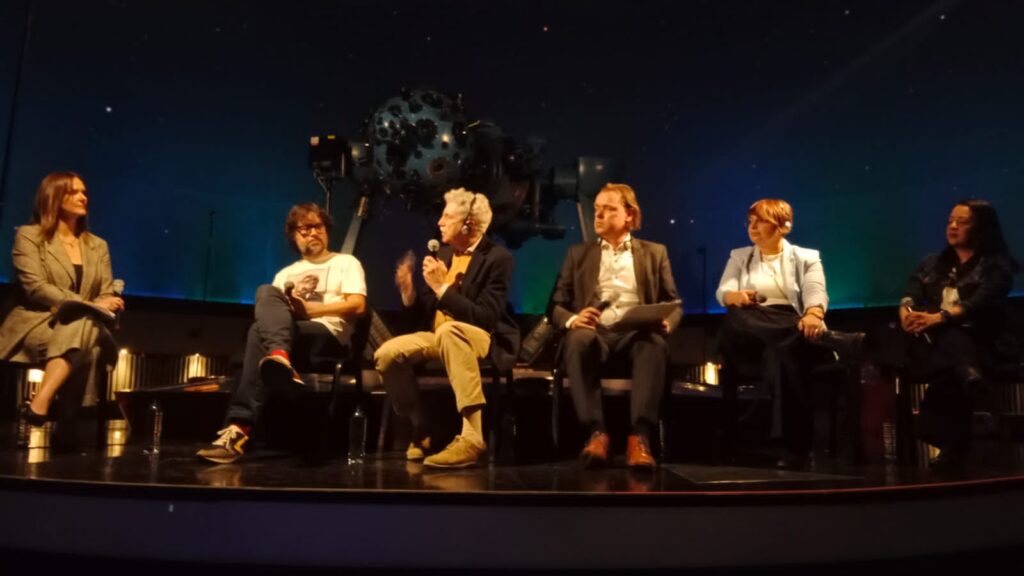
Miller was one of 13 international experts and several international organizations such as CAF and C40 who were invited to take part in the week.
All of the invited guests explored the city using a variety of sustainable modes such as walking, e-bikes (using Bogotá’s new Bicycle Share System), e-bus, van, or cable car.
They made site visits and took part in public events and panel discussions where they provided expert commentary on what is going on in Bogotá with respect to mobility, discussing public works in progress to connect multi-modal transportation within Bogotá and the greater Bogotá region.
Miller spoke on a number of topics, including, for example, how to ensure sustainable and participatory business models around zero-emission technologies by adapting businesses that currently rely on fossil fuels for mobility.
Bogotá Mayor Claudia López tweeted and hosted a dinner in honour of the visitors, providing a warm welcome.
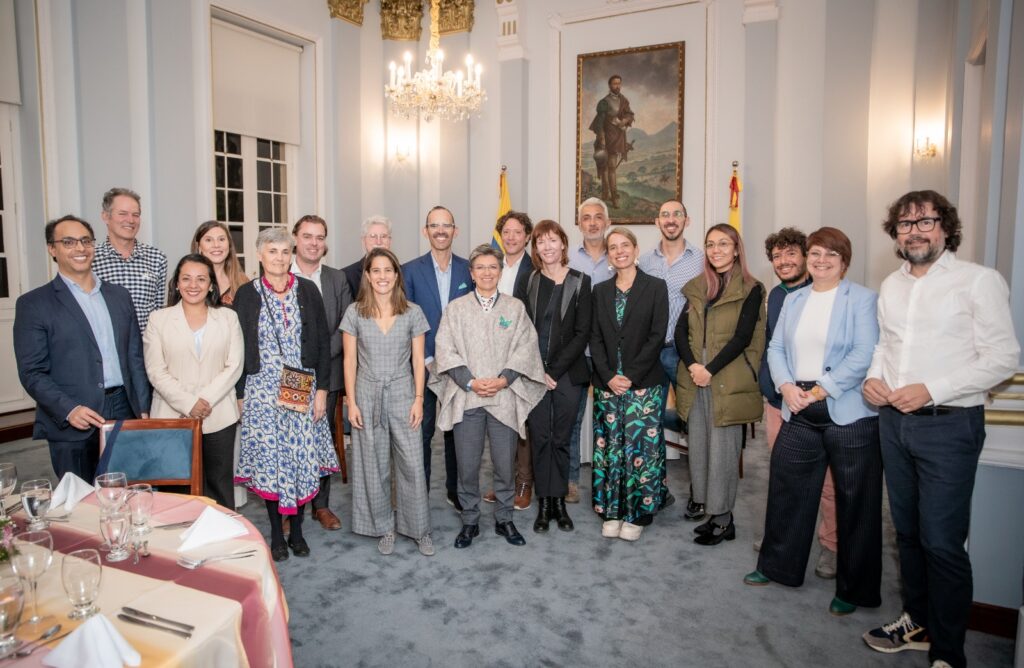
Bogotá Sustainable Mobility Week photo gallery
All photos supplied by Juan David Ballen Gamboa of the Secretaría General - Alcaldía Mayor de Bogotá.
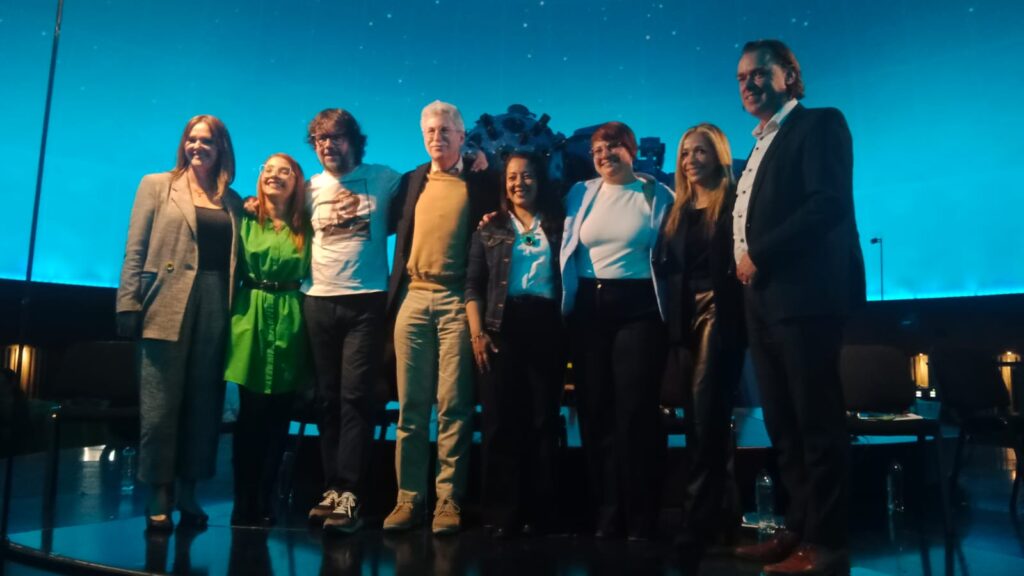
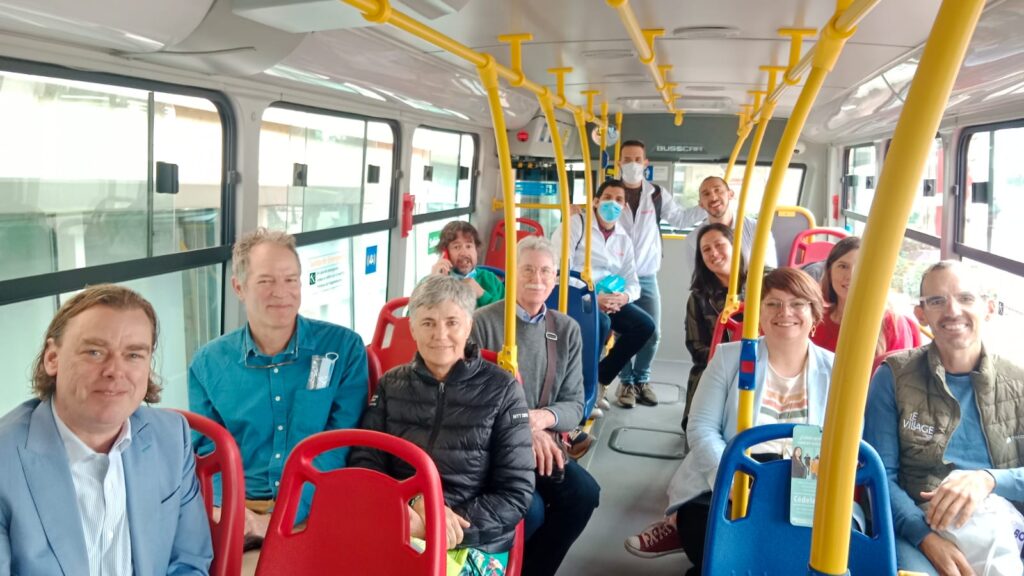
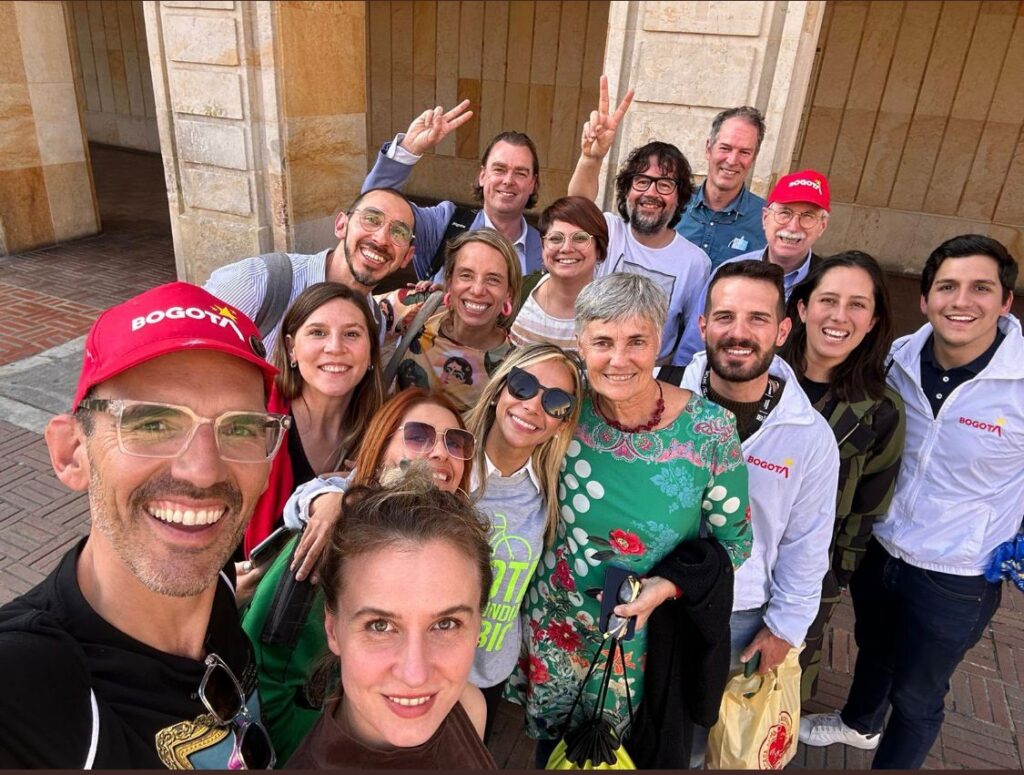
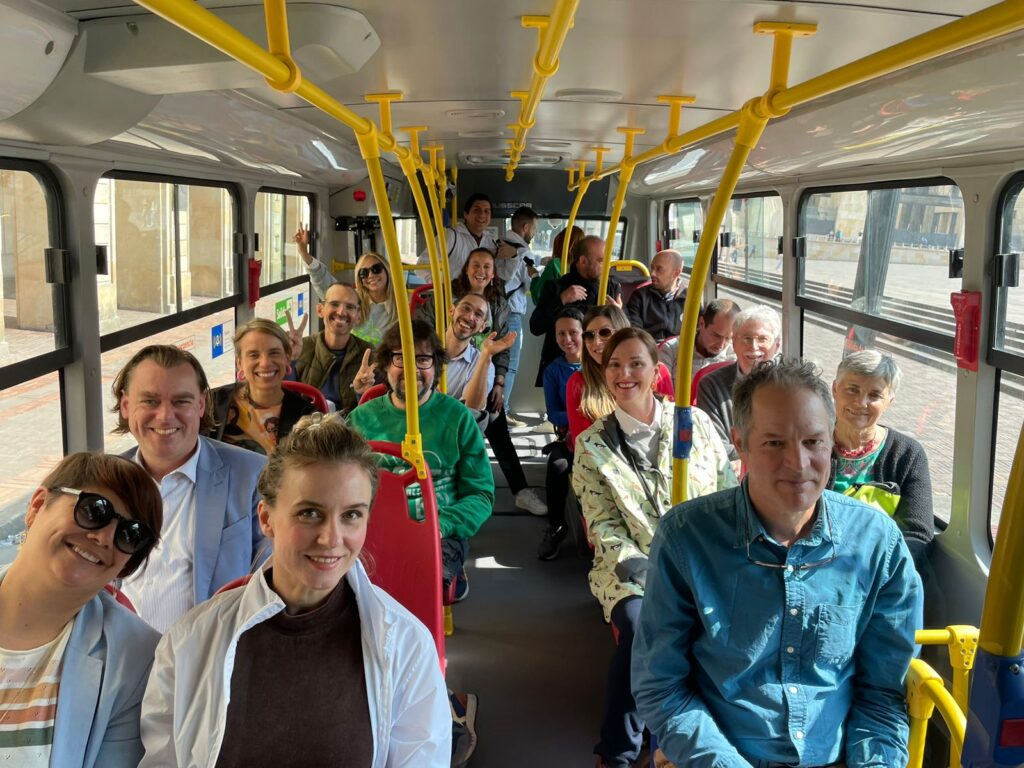
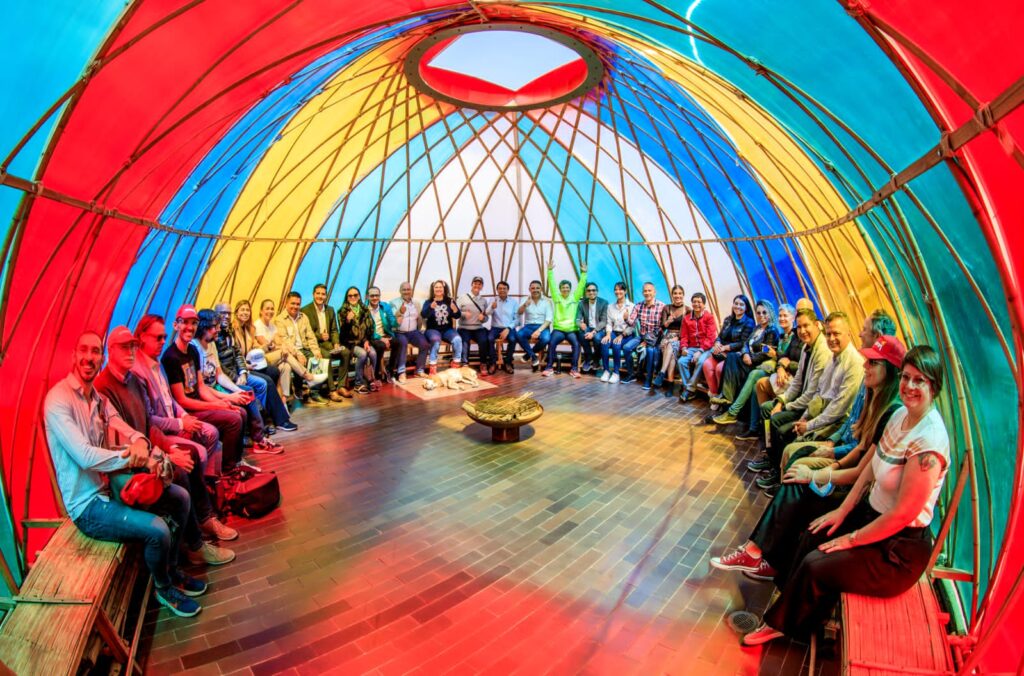
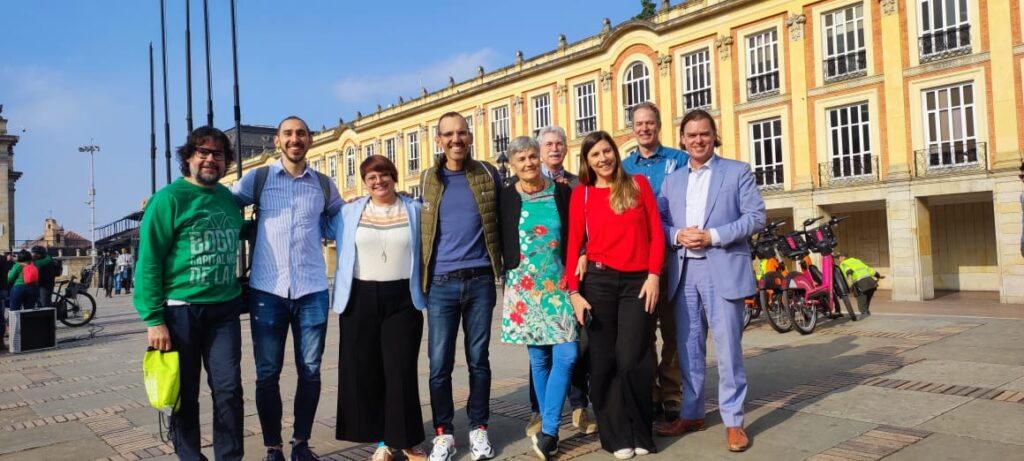
Related posts about Bogotá's Sustainable Mobility Week
- Elevated or underground subway? Expert Eric Miller gives his concept, El Nuevo Siglio, January 30, 2023. (Note: Translate from Spanish using browser)
- International experts arrive in Bogotá to contribute to the construction of modern and efficient mobility, Announcement, Bogotá DC District Mobility Secretariat, January 25, 2023.
- Bogotá hosts Sustainable Mobility Week, No Car Day included, the city paper, January 31, 2023.
An exploration of infrastructure and time led by Professor Shoshanna Saxe, Canada Research Chair in Sustainable Infrastructure
Making priorities about infrastructure investment is increasingly a focus of politics and government debates. However, too often the discussion and imagining of infrastructures futures is divorced from practical considerations of time. We cannot wish large projects or new systems into existence; it takes years to decades to plan and physically construct heavy infrastructure. Further, once operating, civil infrastructure is near permanent making it critical to not build the “wrong" projects. However, we can also not accept doing nothing, or delaying too long, given pressing social and environmental need. In addition, long term projects still need to be started and stewarded over the shorter term.
The dual needs to prioritize effective rapid approaches to infrastructure in the near term without investing in dead ends, while simultaneously establishing robust planning and decisions processes for large infrastructure investments that take decades, makes the exploration of time and infrastructure complex and pressing.
This workshop is invitation-only.
Workshop goal
The goal of this workshop is to discuss a short term infrastructure horizon. What can and should we do on the 1 to 5 year time scale?
This work contributes to three ongoing discussions within the infrastructure sector:
- The increasing infrastructure deficit,
- The need to rapidly adapt infrastructure systems for climate change, and
- Barriers to infrastructure development (limited budgets, conflicting stakeholder perspectives, institutional intransience).
Agenda
9:45 a.m. - Doors open. Coffee, tea, and water available.
10 a.m. - Workshop commences.
12 noon - Lunch.
Sponsors
This workshop is funded by the Royal Academy of Engineering Distinguished International Associates Round 2 and the University of Toronto Mobility Network.
The transportation world is booming but in flux: the industry is being reshuffled, communities and cities are often confused and anxious about their mobility future, and the ecosystem pressure is daunting.
Mobility is in the midst of profound transformation with an unprecedented combination of new technologies: autonomy, electrification, connectivity, and AI, meeting new evolving priorities: decarbonization, public health, and social justice.
In this talk, Professor Zhao sharply focuses on two forces that drive the mobility future: behaviour and computation.
Behaviorally he investigates: Is travel social? Is travel emotional? And is travel perceptual? He uses a behavioural lens to examine mobility technologies and translates business decisions into a set of behavioural inquiries. Every single organization or company exists to change someone’s behaviour.
Computationally, he brings AI and machine learning methods to sense, predict, nudge and regulate travel behaviour. He demonstrates the power of bringing behavioural and computational thinking together, in order to make mobility services predictive, individualized, and experimental. He will illustrate how to design multimodal mobility systems that integrate shared and autonomous services with public transit.
Panel discussion to follow
Following his talk, Professor Zhao will be joined by Ryan Lanyon, Manager of New Technology and Innovation at the TTC, and Professor Amer Shalaby, Director of the Transit Analytics Lab, for a panel discussion moderated by Professor Marianne Hatzopoulou, Director of Positive Zero Transport Futures.
About the speaker
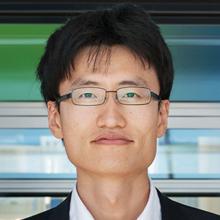
Jinhua Zhao is the Edward and Joyce Linde Associate Professor of City and Transportation Planning at the Massachusetts Institute of Technology (MIT). He integrates behavioral and computational thinking to decarbonize the global mobility system.
Prof. Zhao founded and directs the MIT Mobility Initiative, coalescing the Institute’s efforts on transportation research, education, entrepreneurship, and civic engagement. He hosts the MIT Mobility Forum, curating cutting-edge transportation research across the globe. Prof. Zhao directs the JTL Urban Mobility Lab and Transit Lab at MIT. He leads long-term collaborations with transportation authorities and operators worldwide, including London, Chicago, Washington DC, and Hong Kong and enables cross-culture learning between cities in North America, Asia and Europe. He develops methods to sense, predict, nudge, and regulate travel behavior, and designs multimodal mobility systems that integrate autonomous vehicles, shared mobility, and public transport. He is the co-founder and chief scientist for TRAM Global, a mobility decarbonization venture.
About the panel
Marianne Hatzopoulou, moderator
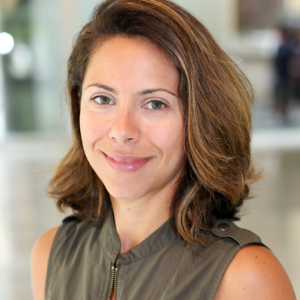
Marianne Hatzopoulou is Professor in the Department of Civil and Mineral Engineering at the University of Toronto and Tier 1 Canada Research Chair in Transport Decarbonization and Air Quality. She leads the Transportation and Air Quality (TRAQ) research group studying the interactions between transportation, air quality, climate change, and public health; she published 150 publications on these topics. Prof. Hatzopoulou is also the Director of Positive Zero Transport Futures, a living lab ecosystem for testing transport decarbonization innovations with positive societal outcomes. Prof. Hatzopoulou is on the Canadian team of researchers who were the 2021 recipients of the NSERC Brockhouse Canada Prize for Interdisciplinary Research in Science and Engineering. In 2022, she received the University of Toronto Engineering Alumni Network 2T5 Mid-Career Achievement Award. She is an associate editor of the journal Transportation Research Part D: Transport and Environment and the incoming chair for the Transportation Research Board Standing Committee on “Air Quality and Greenhouse Gas Mitigation” (2023-2026).
Ryan Lanyon

Ryan Lanyon is the Manager of New Technology and Innovation at the TTC, having recently joined after a decade with the City of Toronto. Ryan has been working in local government for more than 20 years, starting out in demand management and providing online ridematching services to commuters. More recently, Ryan led the West Rouge Automated Shuttle Trial, developed the Transportation Innovation Zone at Exhibition Place, and recommended policies to City Council regarding micromobility. Ryan is also learning and researching methods of applying strategic foresight to prepare Toronto's transportation system for emerging and future transportation technologies.
Amer Shalaby
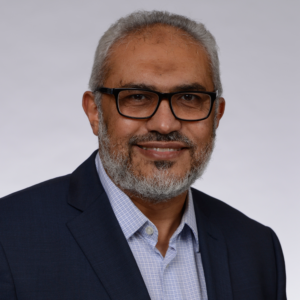
Dr. Shalaby is Professor and Bahen/Tanenbaum Chair in Civil Engineering at the University of Toronto. He is the founding Director of the Transit Analytics Lab (TAL) and Co-Director of the Centre for Automated and Transformative Transportation Systems (CATTS). Dr. Shalaby is specialized in transit planning and scheduling, intelligent transit systems, transit operational management, transit system resilience, automated and connected transit technologies, and simulation and modelling of transportation systems. He has served on various technical committees and journal editorial boards. He also served on advisory panels of multiple transportation projects in Canada and internationally.
-----
This free event is presented by the Department of Civil & Mineral Engineering Distinguished Lecture Series and co-sponsored by Mobility Network.

